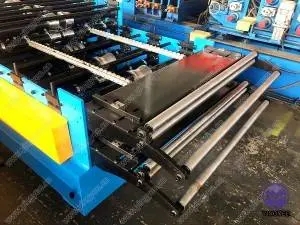
Understanding the Gypsum Stud and Wall Angle Roll Forming Machine
In the realm of construction and interior design, the significance of lightweight materials cannot be underestimated. Gypsum board, commonly known as drywall, has become the go-to solution for a range of applications in building due to its versatility and ease of use. At the heart of the drywall installation process lies an essential component the metal stud and wall angle roll forming machine. This article explores the functionality, importance, and advancements in these machines.
What is a Gypsum Stud?
Gypsum studs, also referred to as metal studs, are framework components that provide the structural support necessary for drywall installations. Unlike traditional wooden studs, metal studs are made from galvanized steel, making them durable and resistant to warping, cracking, and insect infestation. These qualities are particularly valuable in environments that experience high humidity, as moisture can severely damage wooden structures.
The lightweight nature of gypsum studs allows for easier handling and installation. They are typically available in various sizes, which can accommodate different project requirements, from residential to commercial buildings. Moreover, metal studs can be fire-rated, enhancing safety in construction.
The Role of Wall Angle in Construction
Wall angles are vital for creating clean and strong connections between the walls and ceilings. They provide a neat finish to drywall installations and help maintain the structural integrity of the assembly. The return leg of the wall angle supports the gypsum board, while the horizontal leg fastens to the ceiling or wall. This setup enables a smooth surface finish and effective stress distribution.
Implementing wall angles is crucial as they ensure that the drywall remains aligned and secured, preventing sagging or misalignment that could lead to cracks or aesthetic imperfections. Proper installation of wall angles also aids in moisture management, making the entire system more resilient against potential damage.
The Importance of Roll Forming Machines
A wall angle roll forming machine is specifically designed to manufacture metal studs and wall angles efficiently
. These machines convert flat metal sheet materials into pre-defined profiles through a systematic process that involves feeding the sheets into the machine, which then shapes and cuts them according to specified dimensions.
Advantages of using roll forming machines include
1. Consistency and Quality Roll forming allows for high levels of precision and uniform production of metal studs and angles. Manufacturers can achieve consistent profiles that meet strict industry standards.
2. Cost-Efficiency The automated nature of roll forming reduces labor costs associated with manual production. Furthermore, it minimizes waste, as the process utilizes materials more efficiently.
3. Customizability Many roll forming machines offer the flexibility to produce varying profiles and sizes based on specific project needs. This adaptability makes them invaluable tools in the manufacturing sector.
4. Speed Given the streamlined operation of roll forming, production rates are significantly faster compared to traditional methods. This quick turnaround can be crucial in large-scale construction projects where time is of the essence.
5. Durability Producing gypsum studs and wall angles from galvanized steel ensures that the end products possess enhanced durability and longevity, contributing to the overall structural reliability of the building.
Advancements in Technology
With advancements in manufacturing technology, the latest roll forming machines now incorporate intelligent systems for monitoring production quality and efficiency. Automated sensors can detect anomalies in real-time, enabling quick corrective actions and minimizing downtime. Additionally, the integration of software solutions allows for more efficient design processes, optimizing material use and reducing costs further.
Conclusion
The role of gypsum studs and wall angle roll forming machines in construction is indispensable. As the building industry continues to evolve, the demand for lightweight, durable, and cost-effective solutions grows. The innovative technology behind roll forming machines not only enhances productivity but also supports the creation of high-quality products that meet the rigorous demands of modern construction. Understanding and utilizing these tools is essential for builders, architects, and designers aiming for excellence in their projects. Whether it’s a residential home or a commercial edifice, the integration of metal studs and wall angles creates a robust framework that stands the test of time.